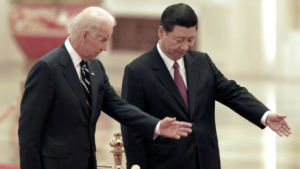Home » Commentary » Opinion » Biden takes power with Pax Americana on the ash heap of history
· The Australian

 Now that Joe Biden is President, it is widely believed that he will repair some of the damage inflicted during the Trump era. After four years of chaos and instability, we are told, the incoming administration will reassert America’s democratic leadership across the globe.
Now that Joe Biden is President, it is widely believed that he will repair some of the damage inflicted during the Trump era. After four years of chaos and instability, we are told, the incoming administration will reassert America’s democratic leadership across the globe.
Don’t believe the hype. The Pax Americana is on the ash heap of history. And the reasons have more to do with Washington’s flawed policies of the post-Cold War era and the rise of China than with the America First nationalism of the Trump era.
Go back three decades. The US had emerged the victor from the Cold War without a shot being fired across Europe. It achieved global hegemonic status not by especially assertive or ambitious action on its part, but by the self-induced collapse of the Soviet empire. The decades-old strategy of containment had worked.
With the end of the East-West standoff, a dangerous bipolar world had been replaced by a unipolar world in which America had no serious rivals. As a result, “American global leadership”, a “New America Century”, “indispensable nation” and “benign hegemony” became the new credos of US foreign-policy elites.
With the September 11, 2001, terror attacks a decade later, outrage over the Islamist jihadists, taken together with the mental habits of American hegemony and American exceptionalism, had given American leaders a clear, overriding sense of purpose. As a result, George W. Bush implemented a sweeping doctrine of preventive warfare, aggressive unilateralism and a crusade for global democracy to “end tyranny in our world”. It is against this background that Trump was best understood. In 2015-16, he ran against both the Republican and Democratic party foreign-policy establishment — from the bipartisan drive to expand NATO eastwards (which just upset Russia’s strategic sensibilities and helped create a new cold war with Moscow) to the misbegotten wars in the Middle East (which had cost the US dearly in blood, treasure, credibility and prestige).
Meanwhile, America’s belief that democracy represents the wave of the future was no longer credible. Since the mid-2000s, the world has experienced what Larry Diamond, a Stanford University scholar, calls a “democratic recession”. The Arab Spring a decade ago has turned into an Arab Winter today: toppling dictators was the easy bit; creating viable democratic states was far more complicated.
However inelegant the language, Trump — not unlike Barack Obama (2009-17) before him — tried to redefine the US role in the world in a way that reflected America’s changing circumstances and more limited resources.
With Biden in power, will things really change? True, Washington will rejoin international treaties such as the Paris climate accord — though how it gets the world’s largest emitter, China, still heavily dependent on foreign fossil fuels, to decarbonise its economy (and hurt its economy) is unclear. In any case, far from representing American global leadership, Biden is inadvertently more likely to embrace America First with a different label and tone.
In Europe, three decades since the collapse of Soviet communism, there will be mounting pressure to reduce the US military presence on the continent and turn NATO over to the Europeans. (Putin’s Russia is a thuggish regime, but it’s hardly the old “evil empire”, as Ronald Reagan dubbed the Soviet Union.)
In the Persian Gulf, three decades since the liberation of Kuwait, an energy-independent America has no vital interest in taking sides in a broader Sunni-Shia security competition. Instead, Washington is more likely to play the Saudis and the Iranians off each other while cutting its military engagements.
Asia, though, is different: the most consequential geopolitical development of the past two decades has been the relentless rise of China, which the US and its allies helped fuel. A US-led coalition of allies will be needed to check Beijing’s regional ambitions.
It is true the US has shown an impressive ability to bounce back from past setbacks, such as the Civil War, the Depression, Pearl Harbor, Vietnam. It is also true that the US has enormous capacity to remain a major player in world affairs. It is the issuer of the world’s reserve currency. Its leading universities, notwithstanding the rising intolerance on campuses, remain the envy of the world. And the shale gas revolution means the US is energy independent for the first time in generations.
It’s just that America will not exercise the kind of influence, power and prestige that it did during the so-called unipolar moment of the post-Cold War era. Besides, many Americans would agree that the biblical injunction, “physician, heal thyself”, should take precedence over any impulse to lead the world.
Remember the national psyche had been profoundly shaken before Trump rudely burst on the political scene. Consider the global financial crisis, the US’s diminished net wealth, the widening economic inequality, the polarised and dysfunctional political system and, as leading neo-conservative intellectual Irving Kristol warned as long ago as the 1990s, “the clear signs of rot and decadence germinating within American society”.
How a virus-ravaged America comes to grips with its limits in a more multipolar world while checking Beijing’s regional ambitions has a claim to be the key question of the next decade.
It is a question of crucial importance for Australia, which has deeply invested in the US alliance in the face of a more threatening China.
Biden takes power with Pax Americana on the ash heap of history